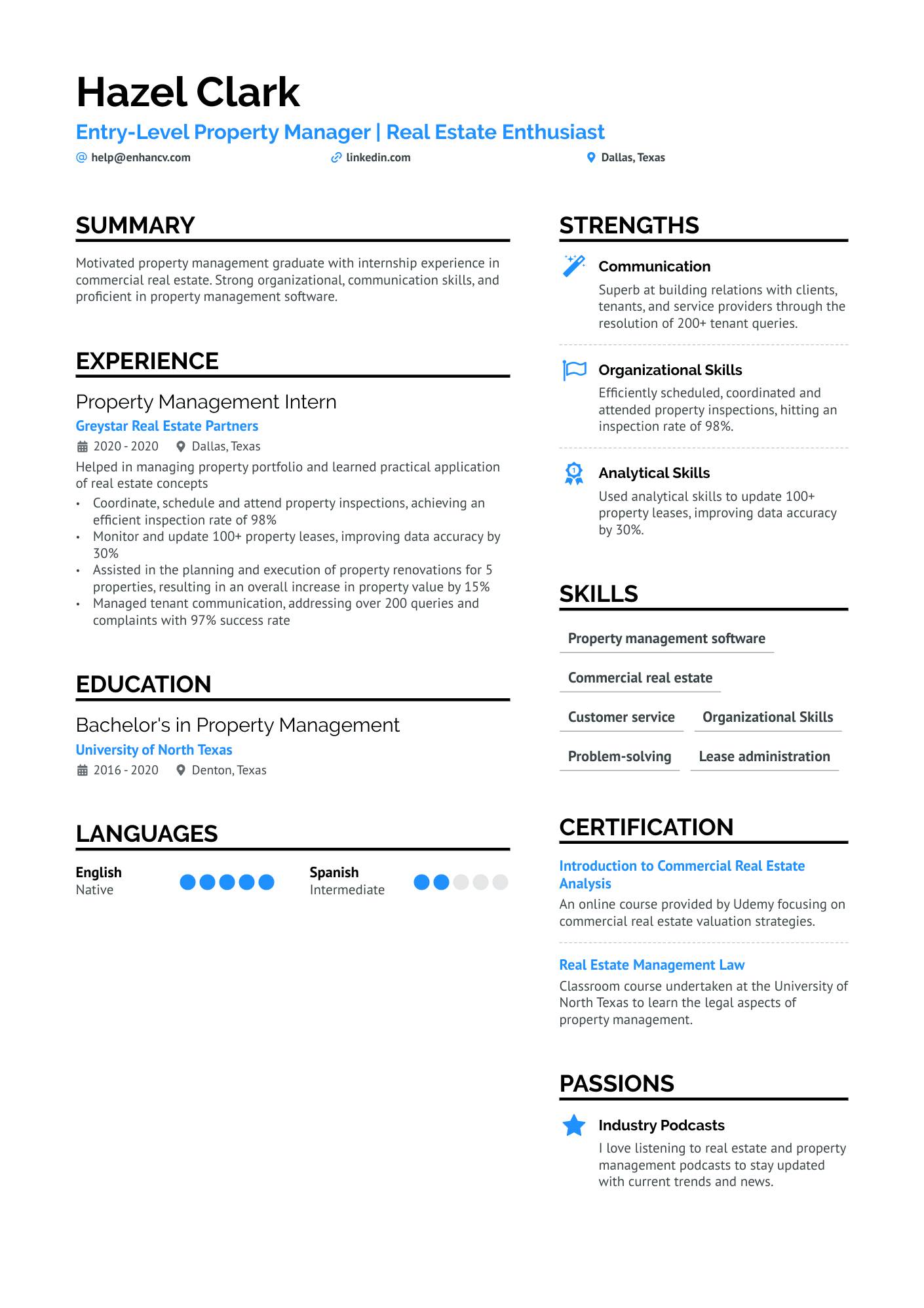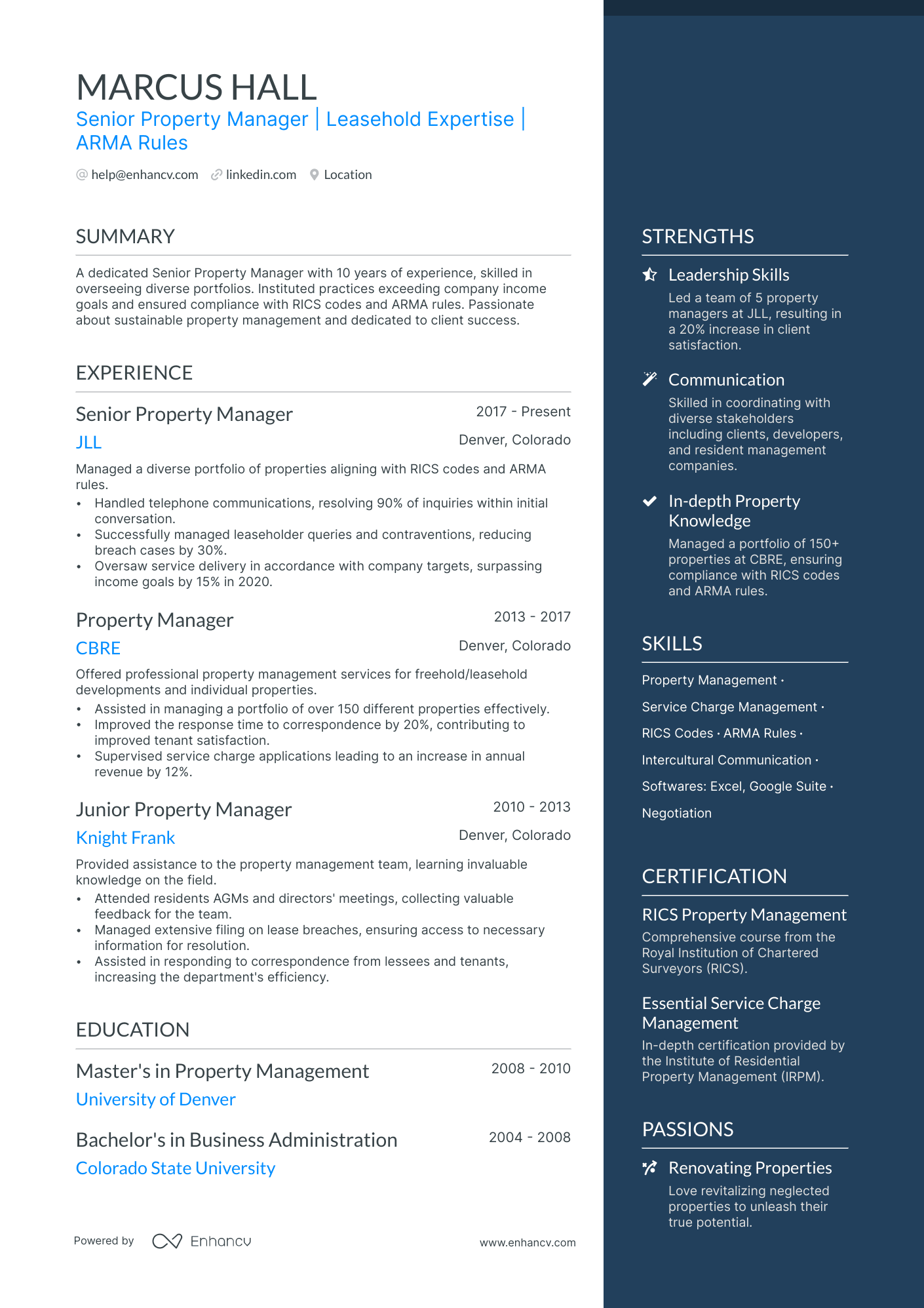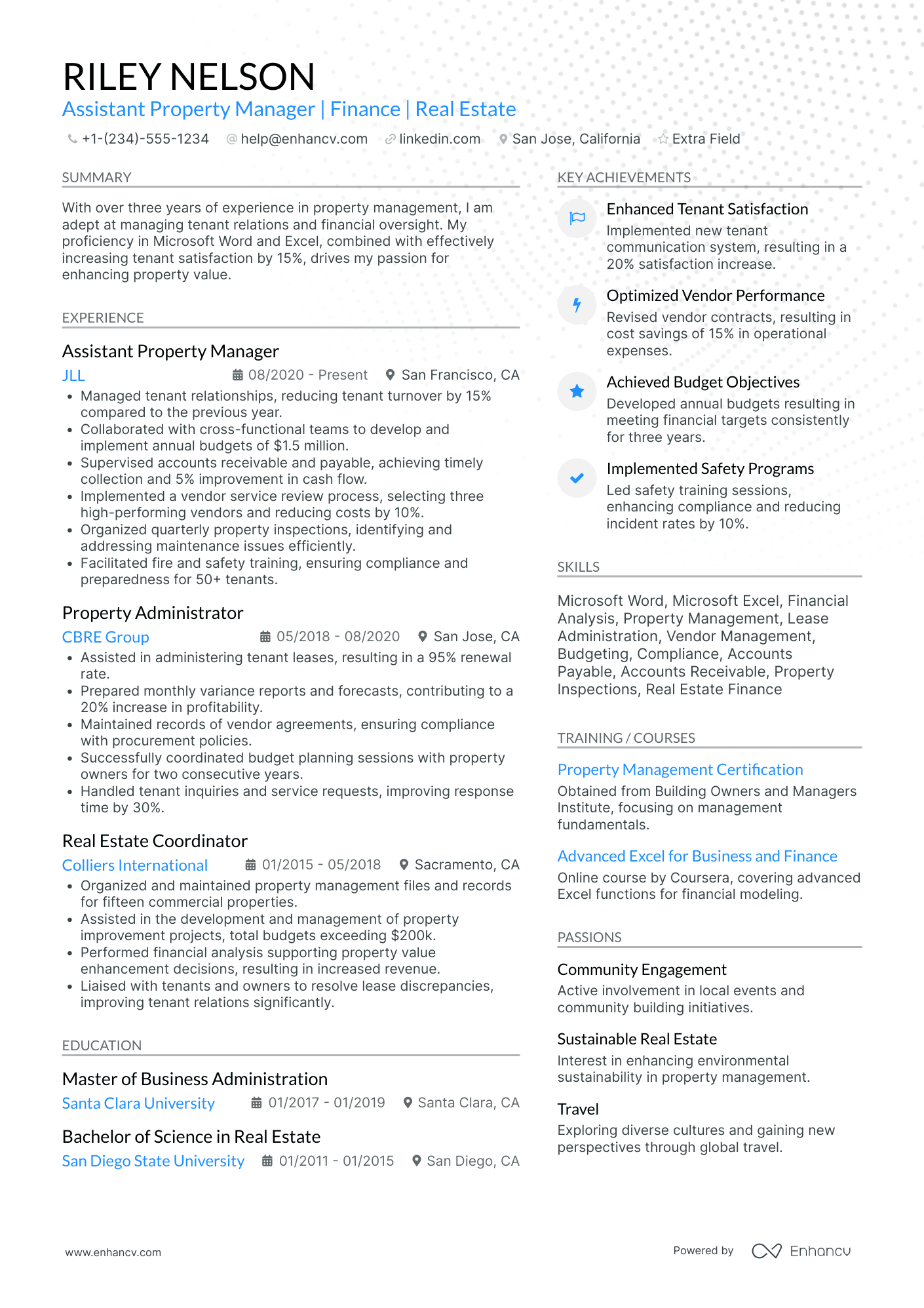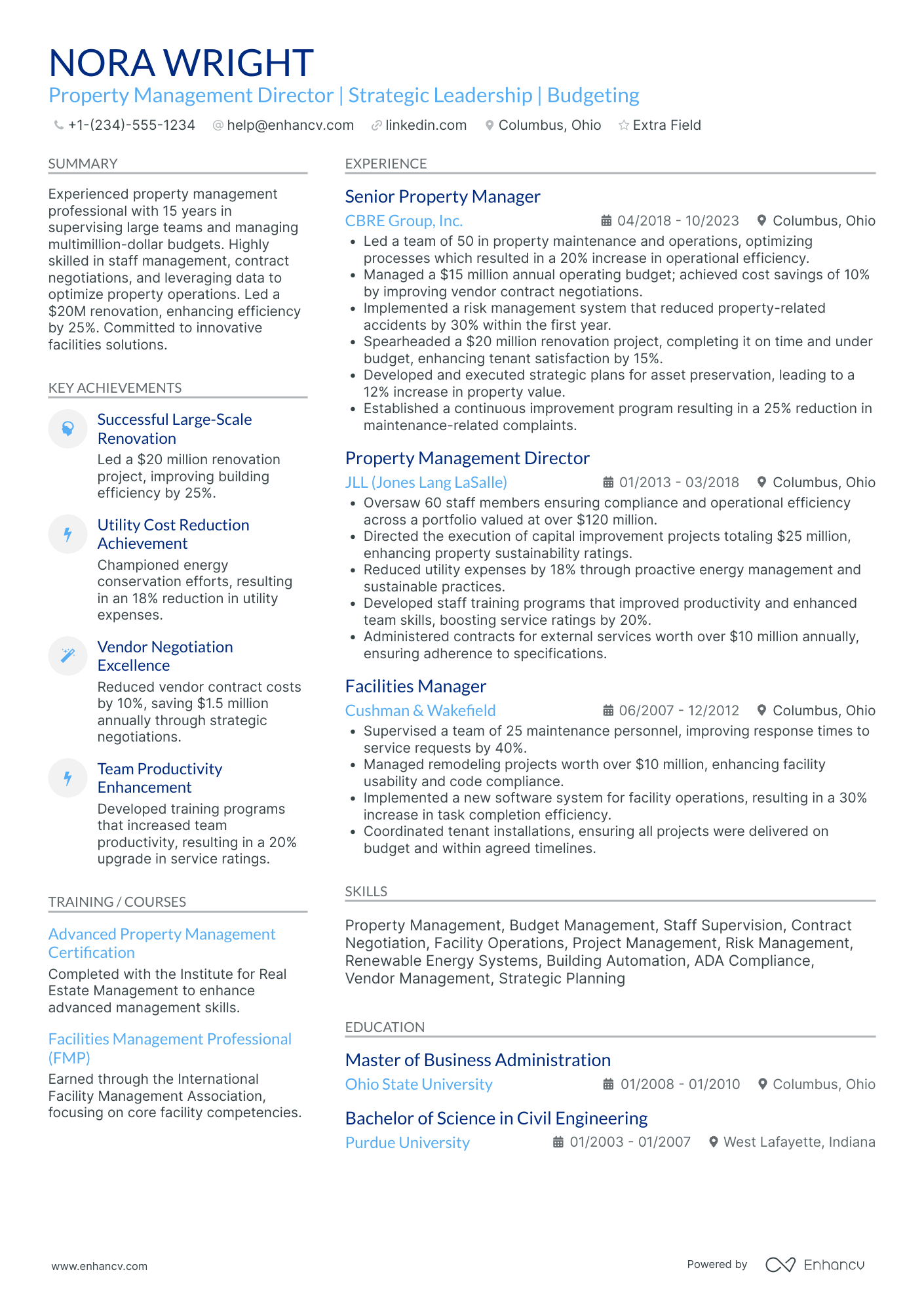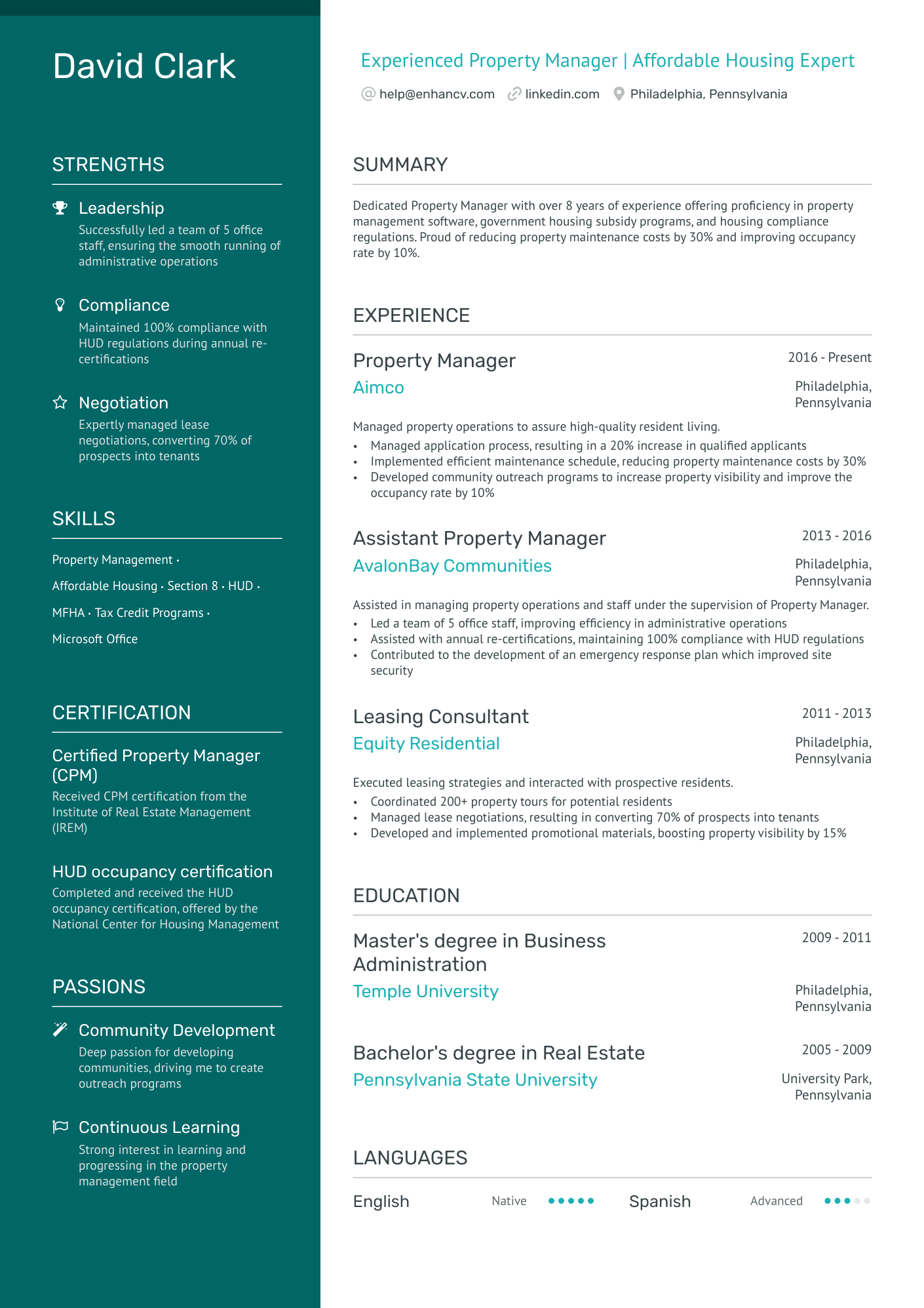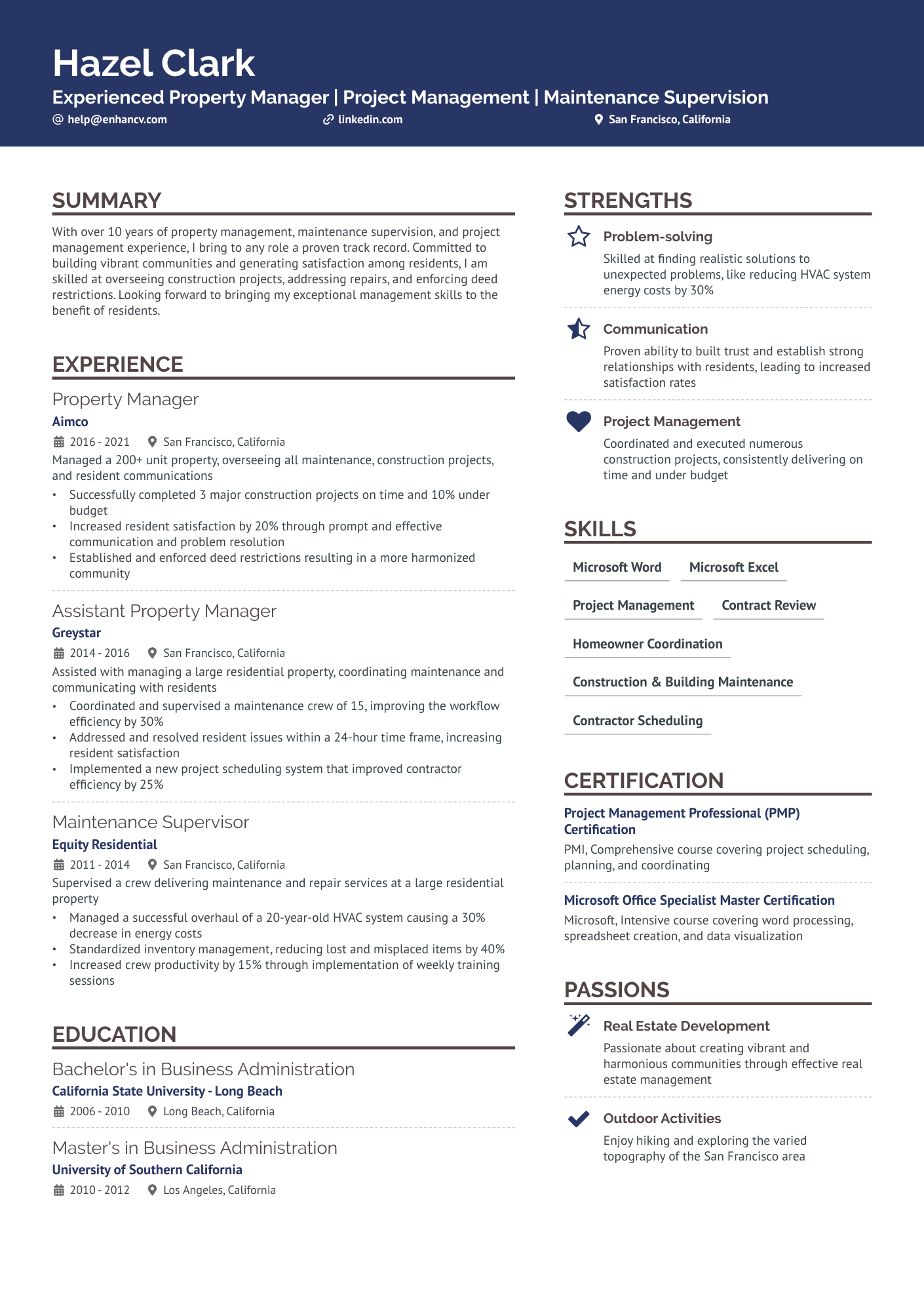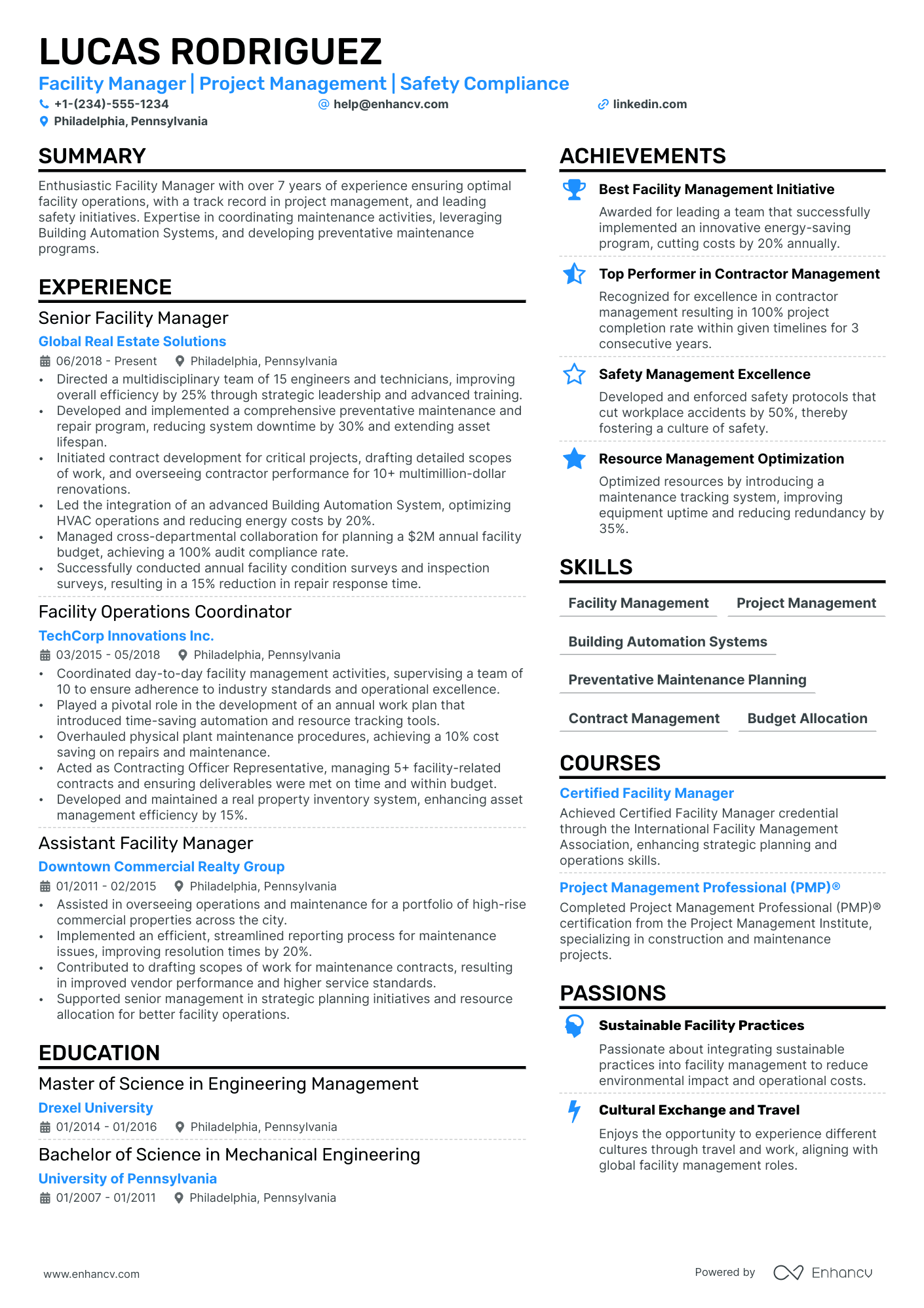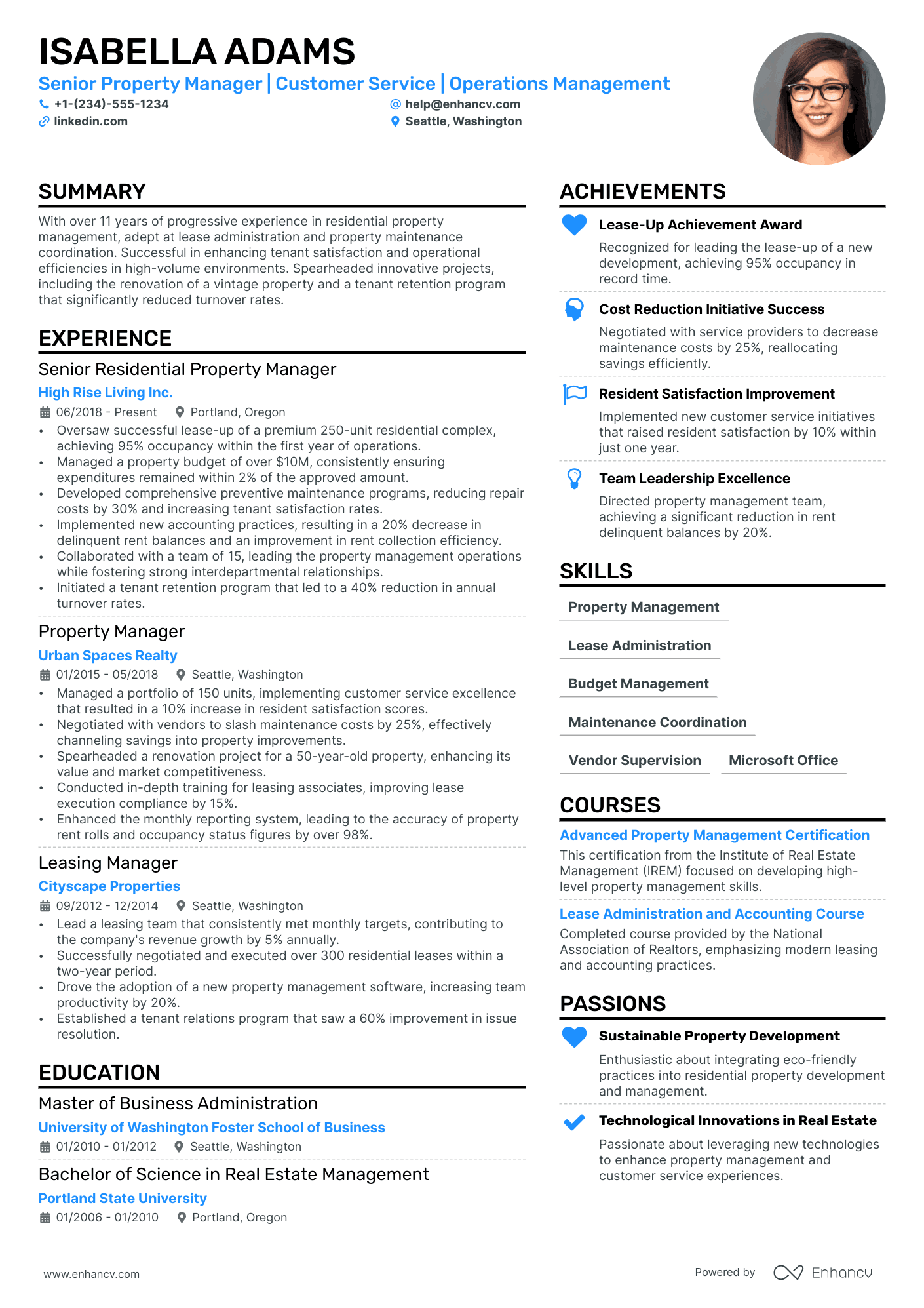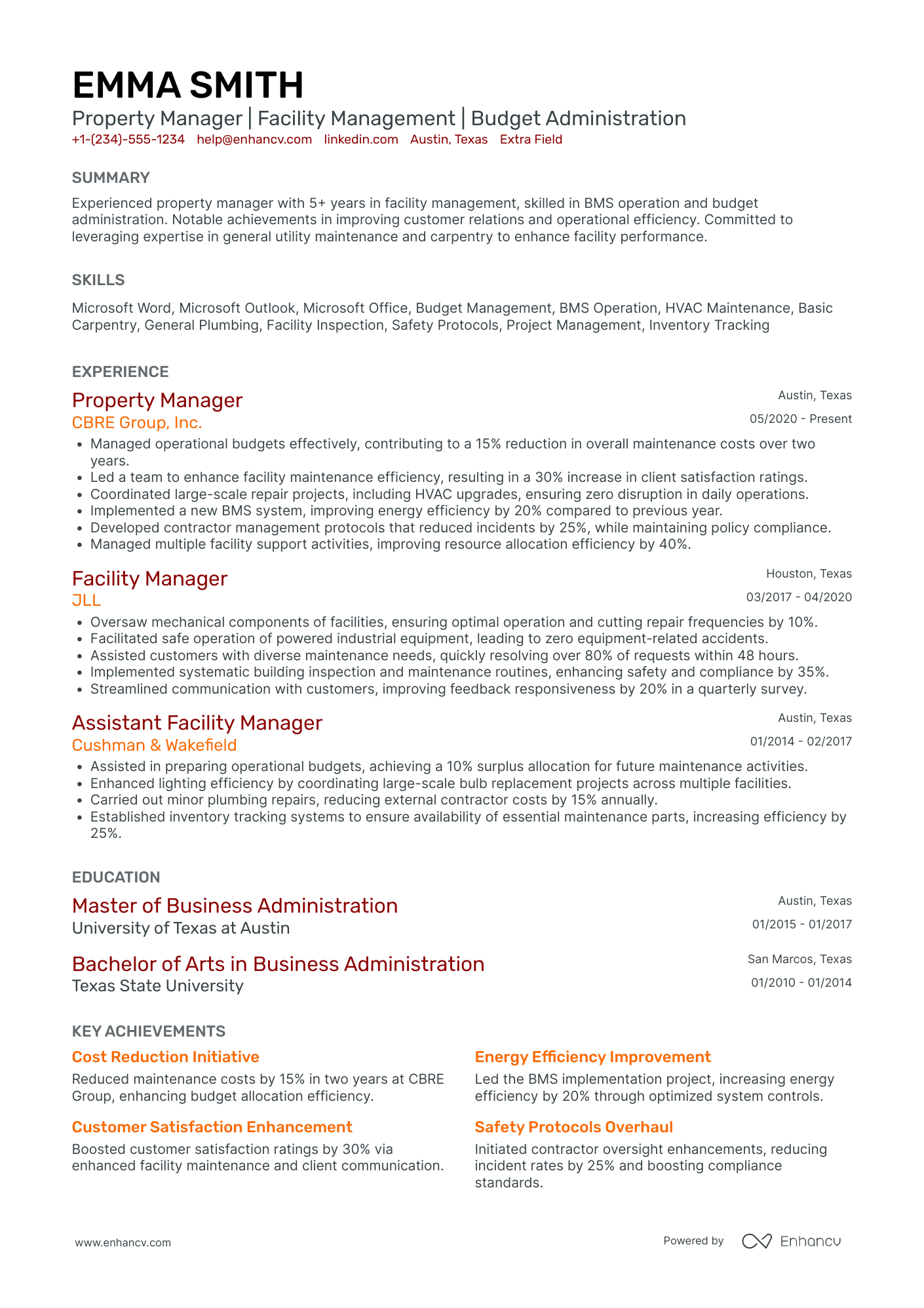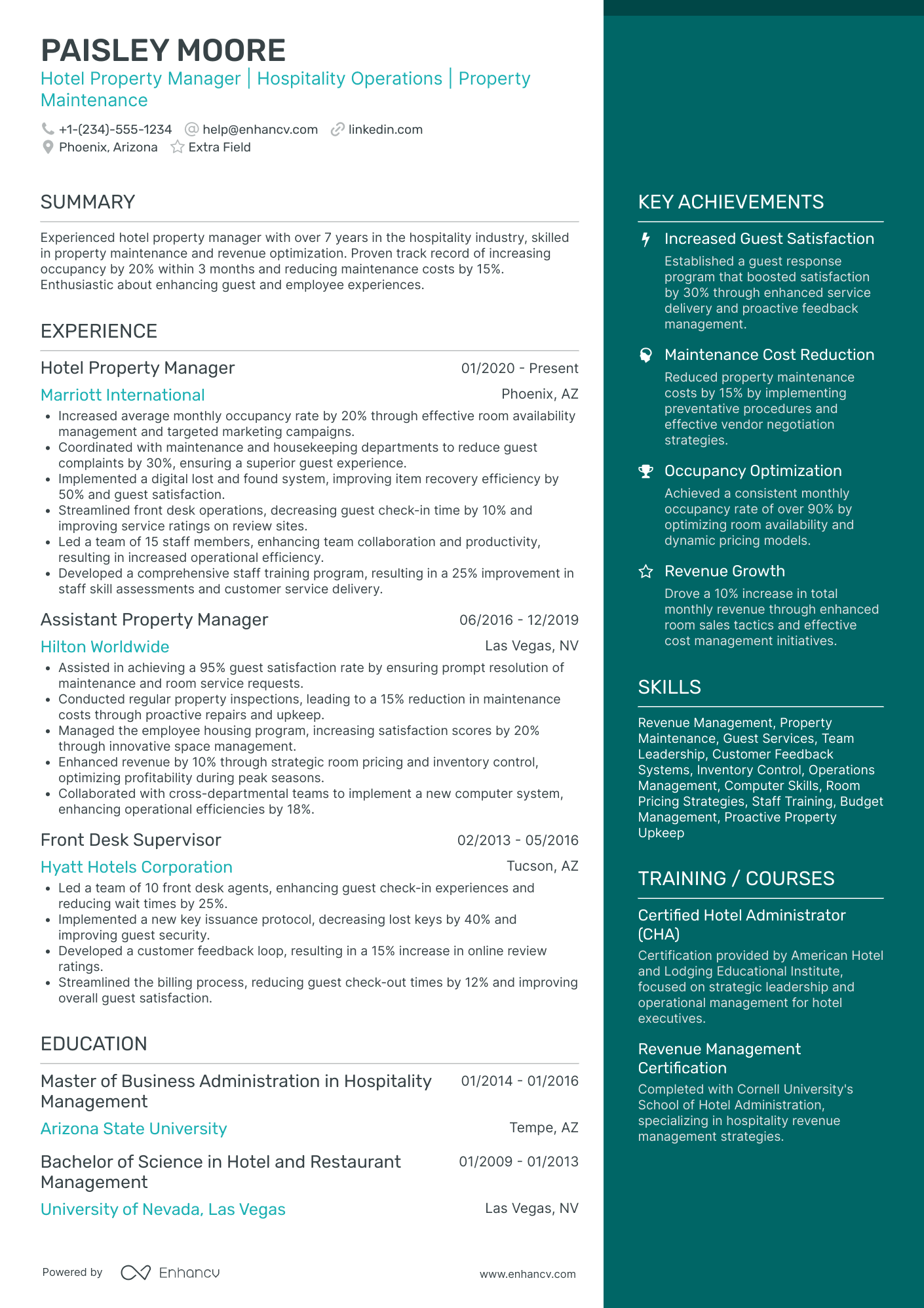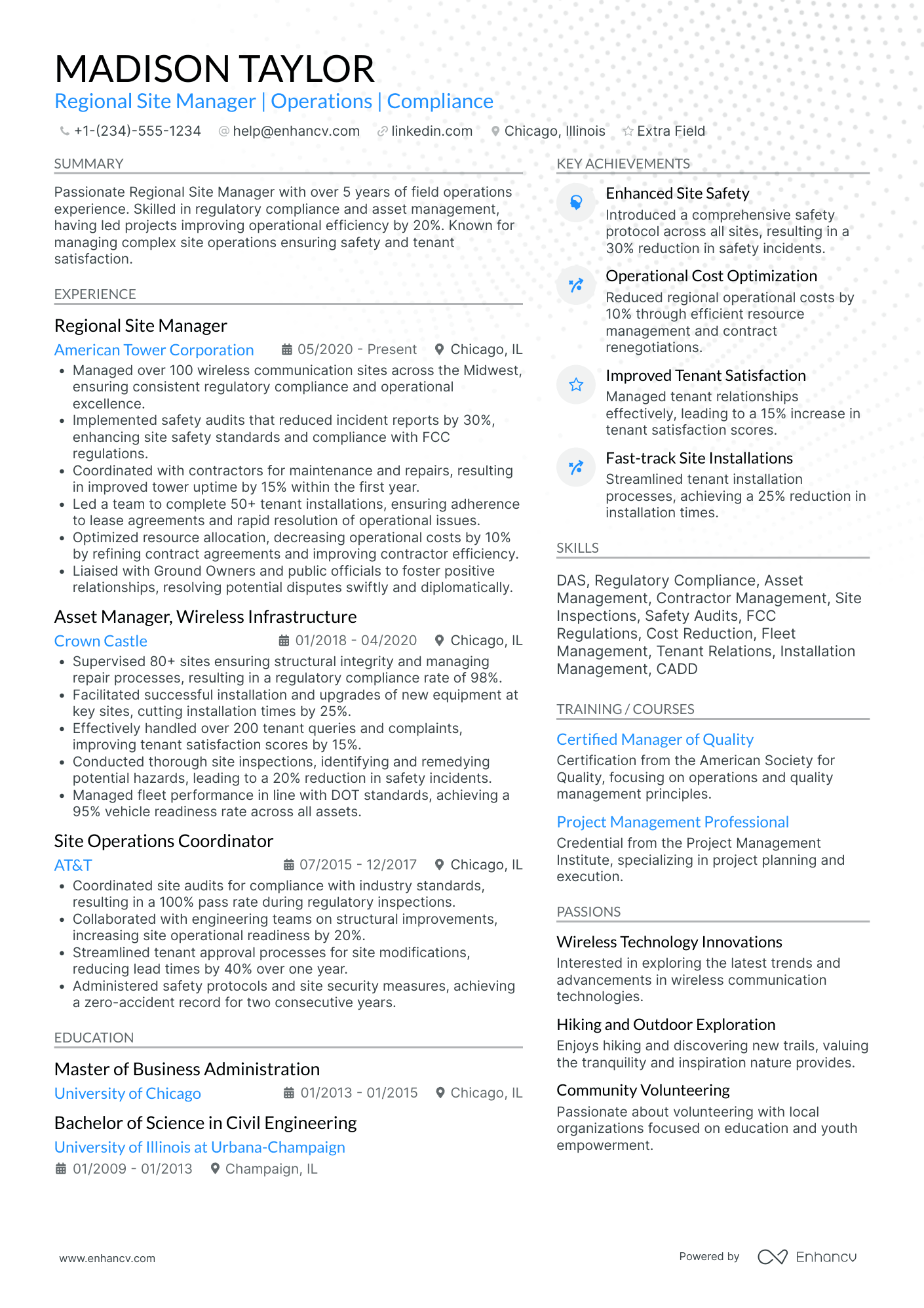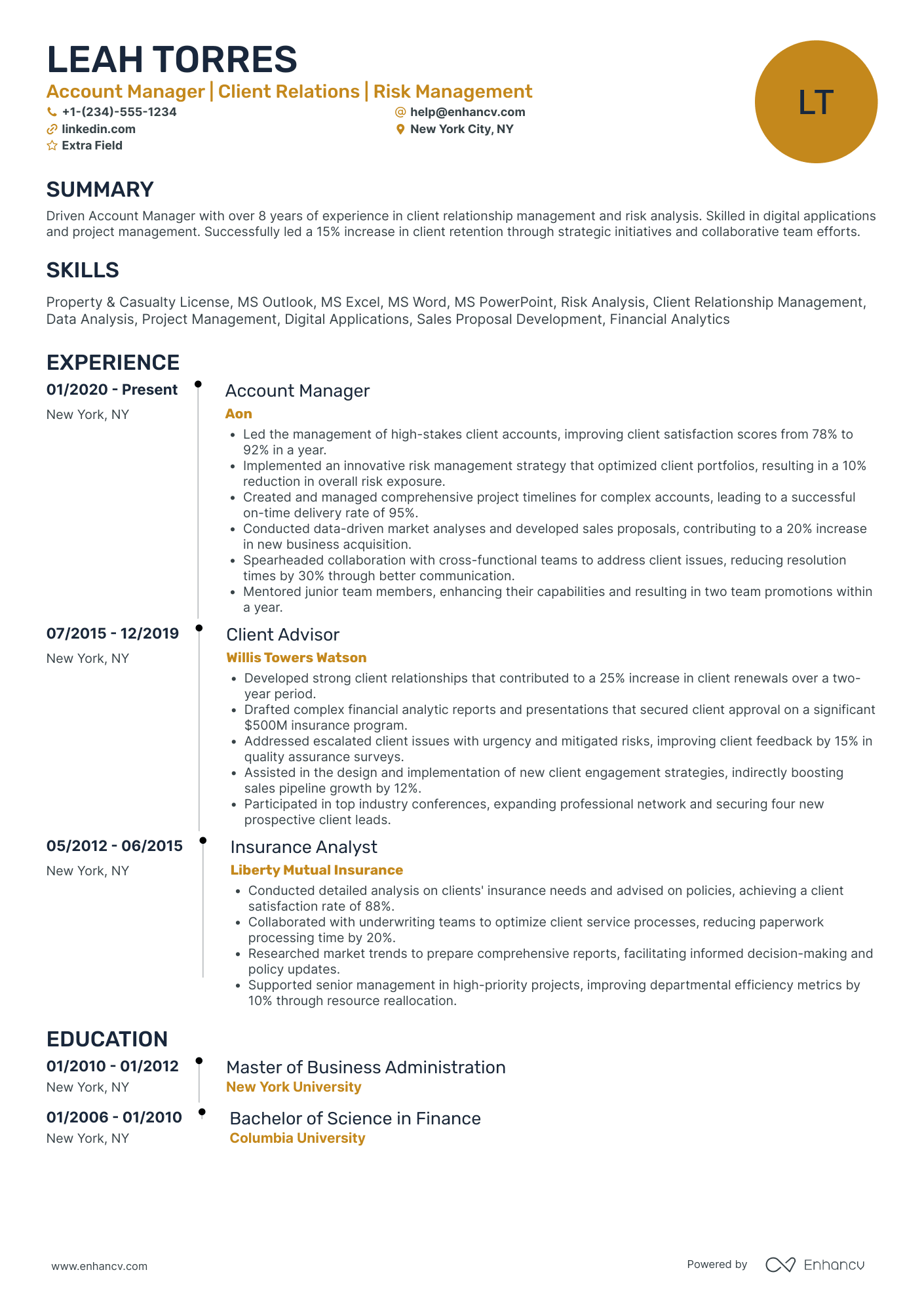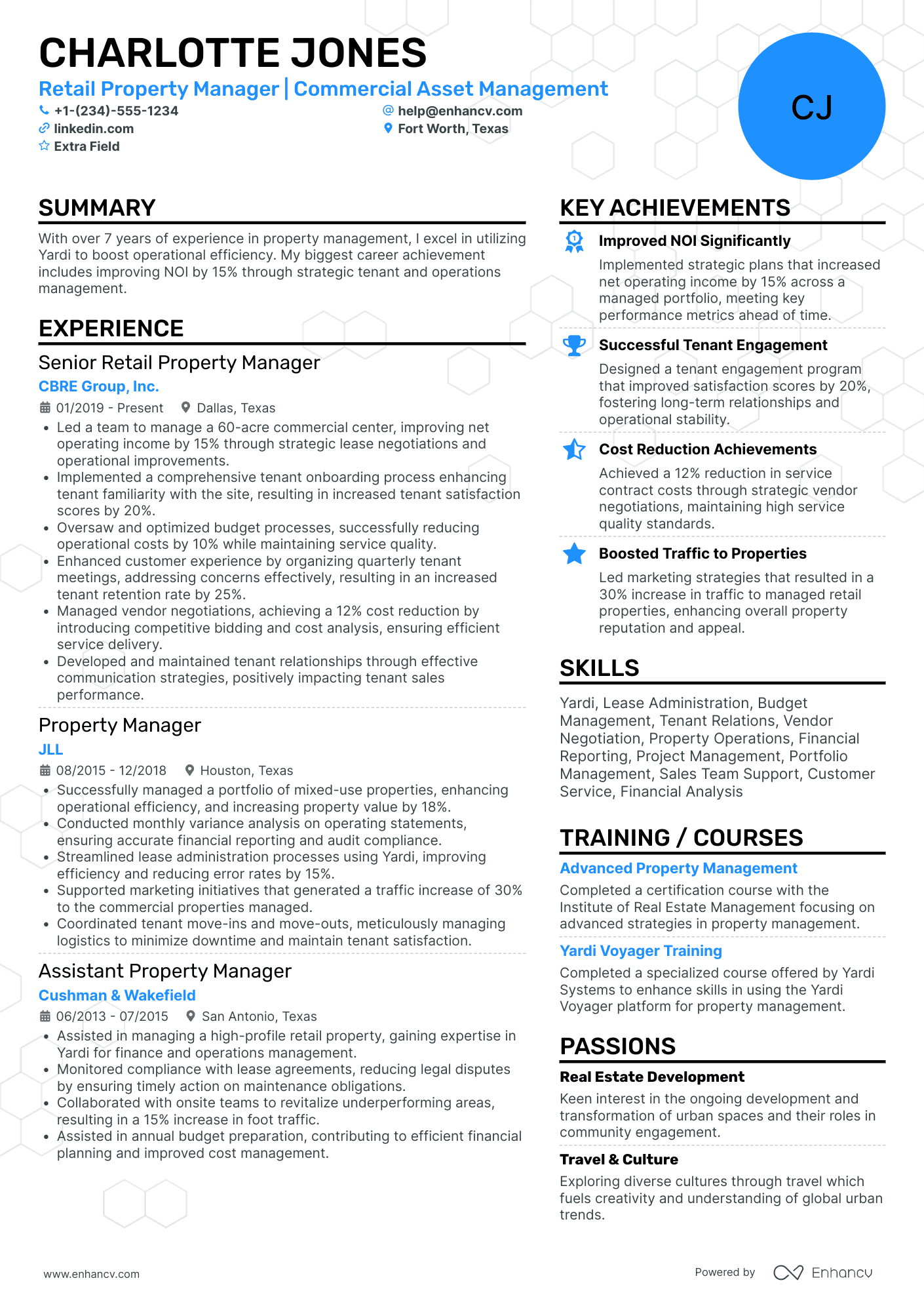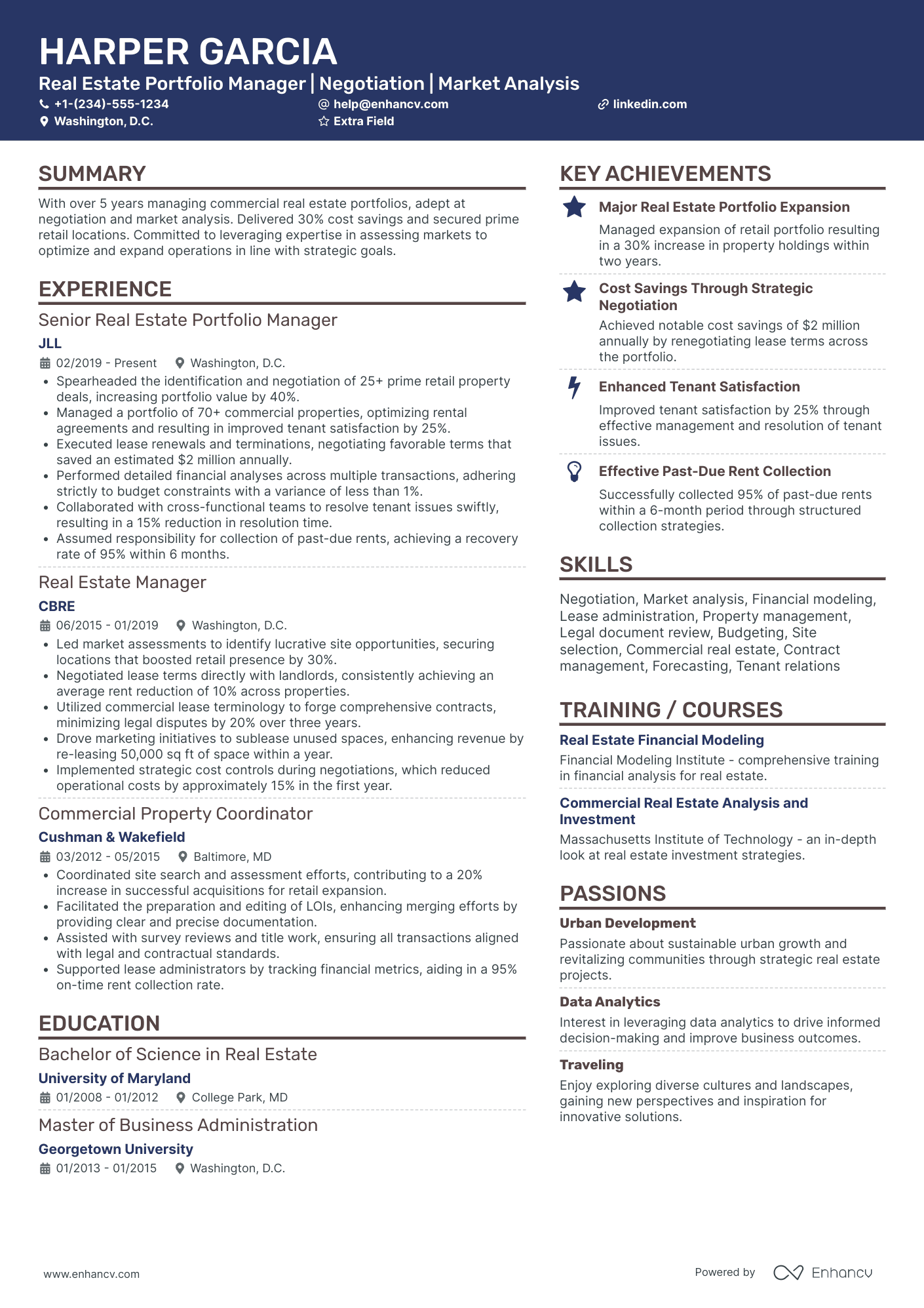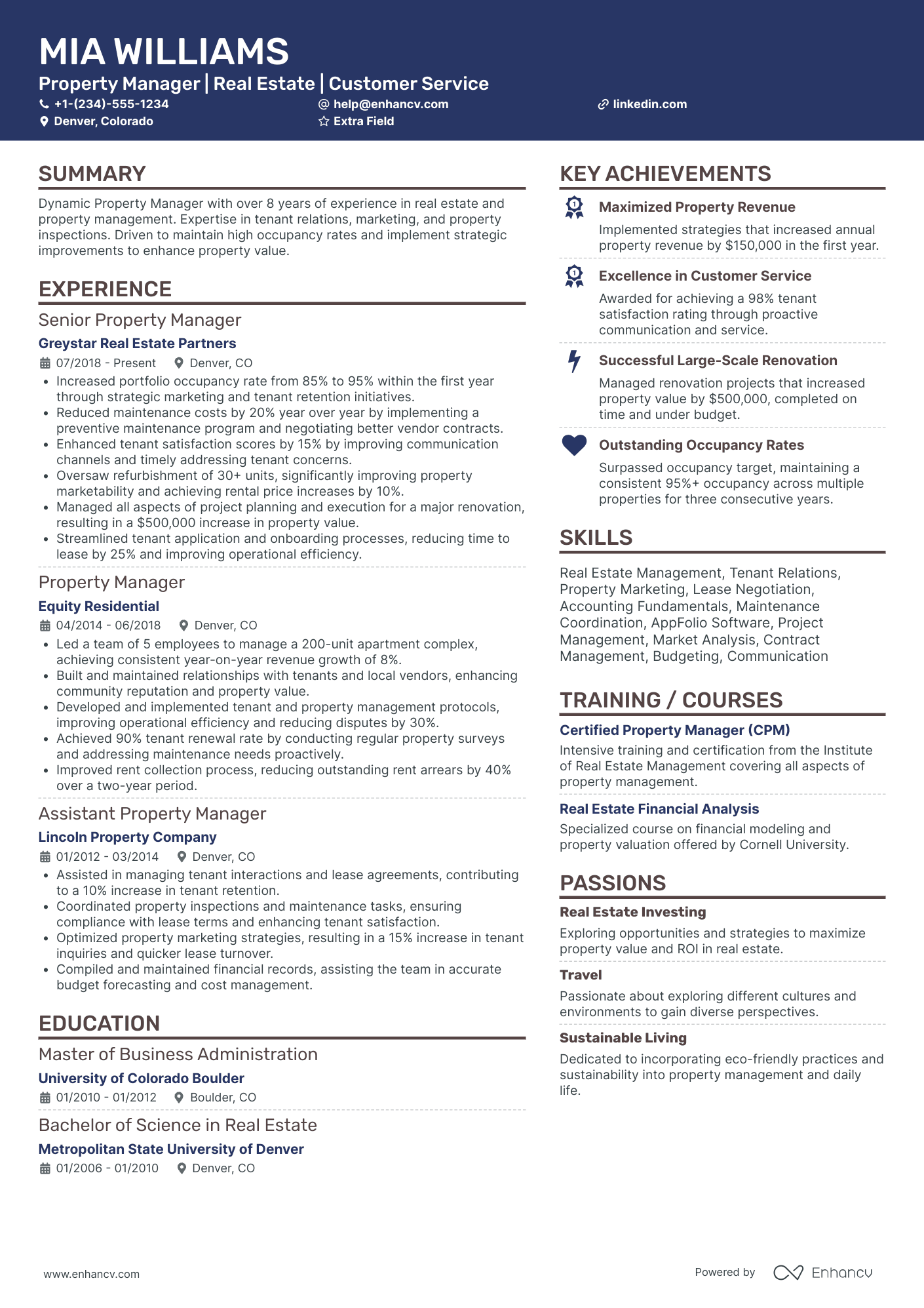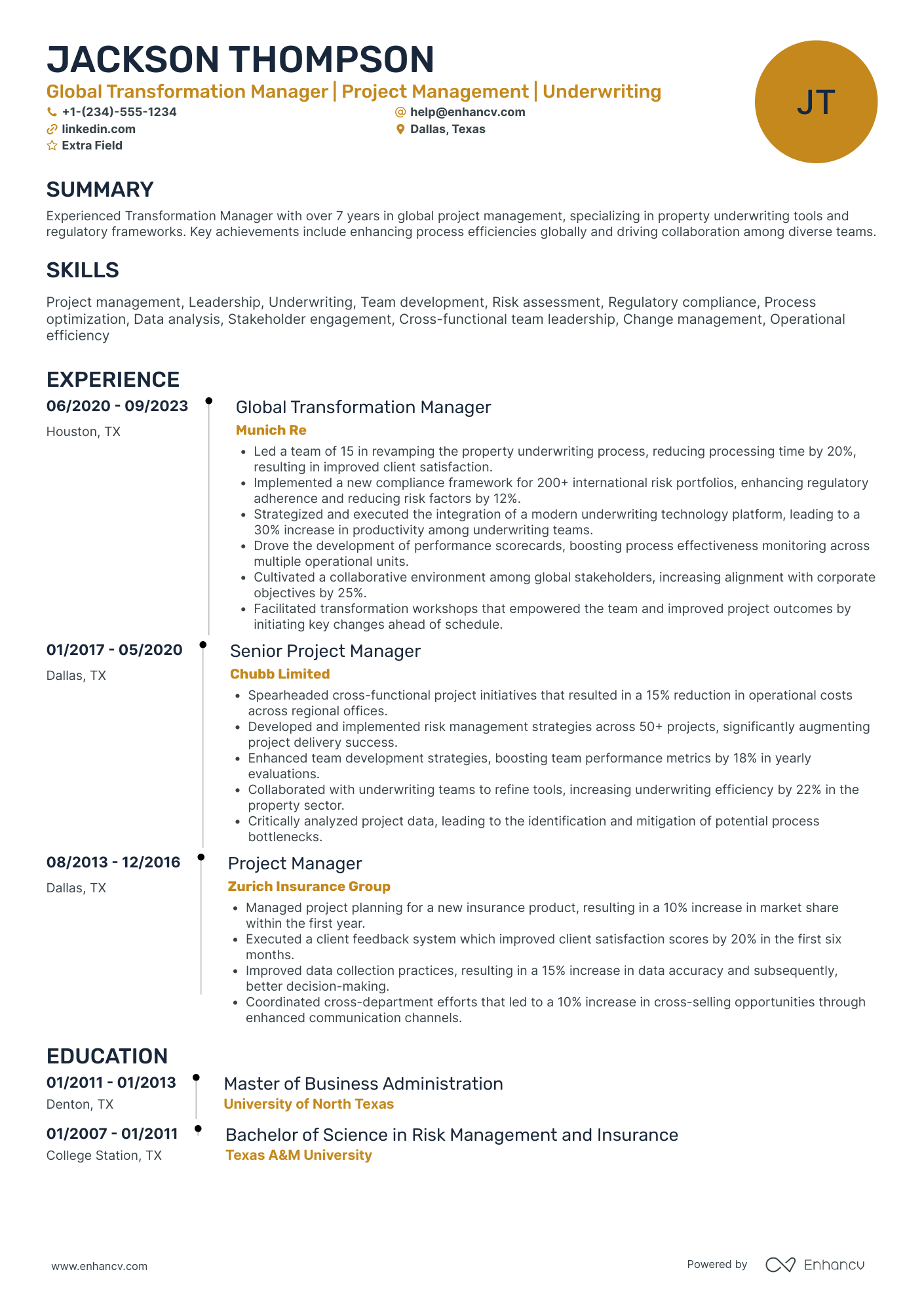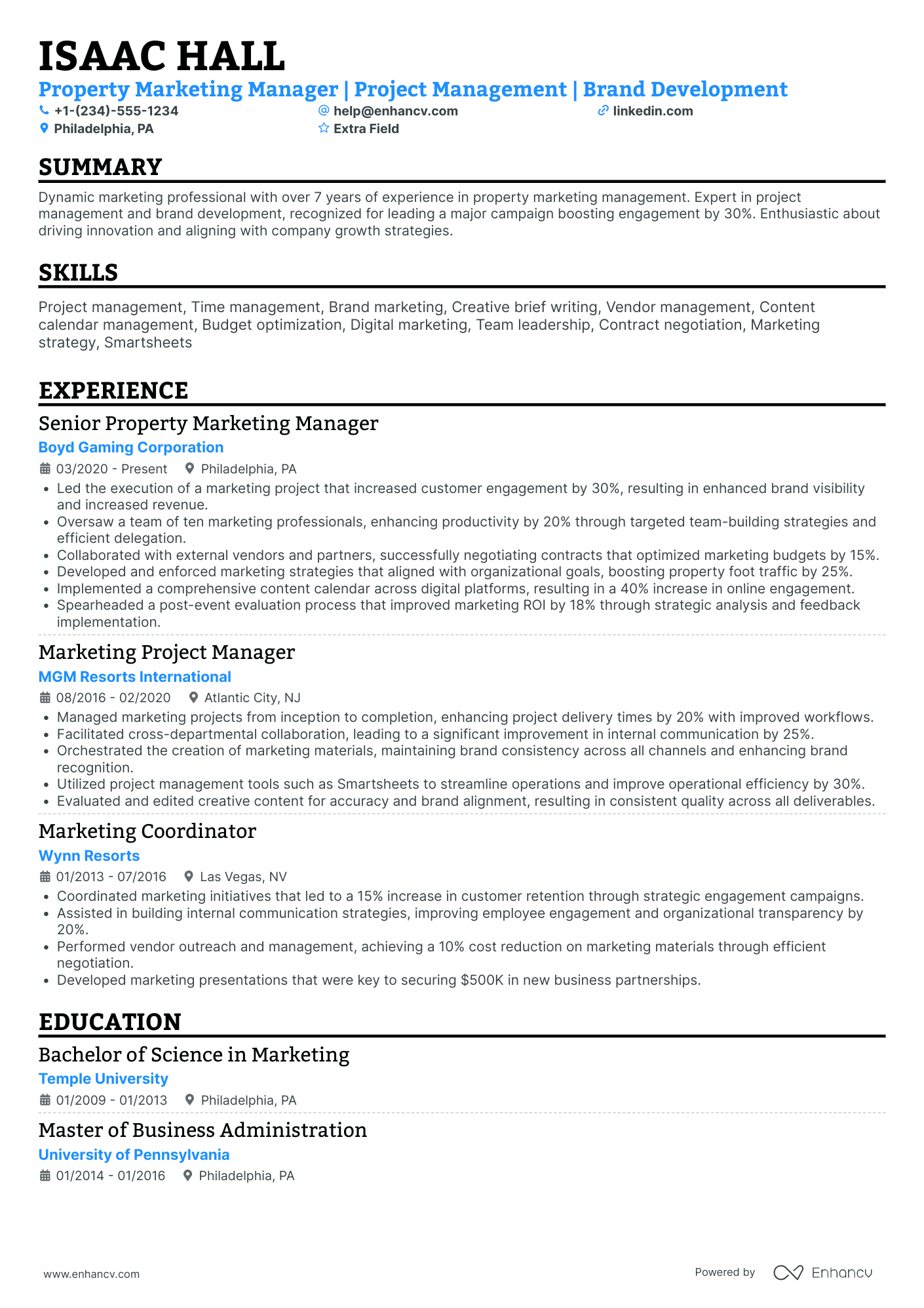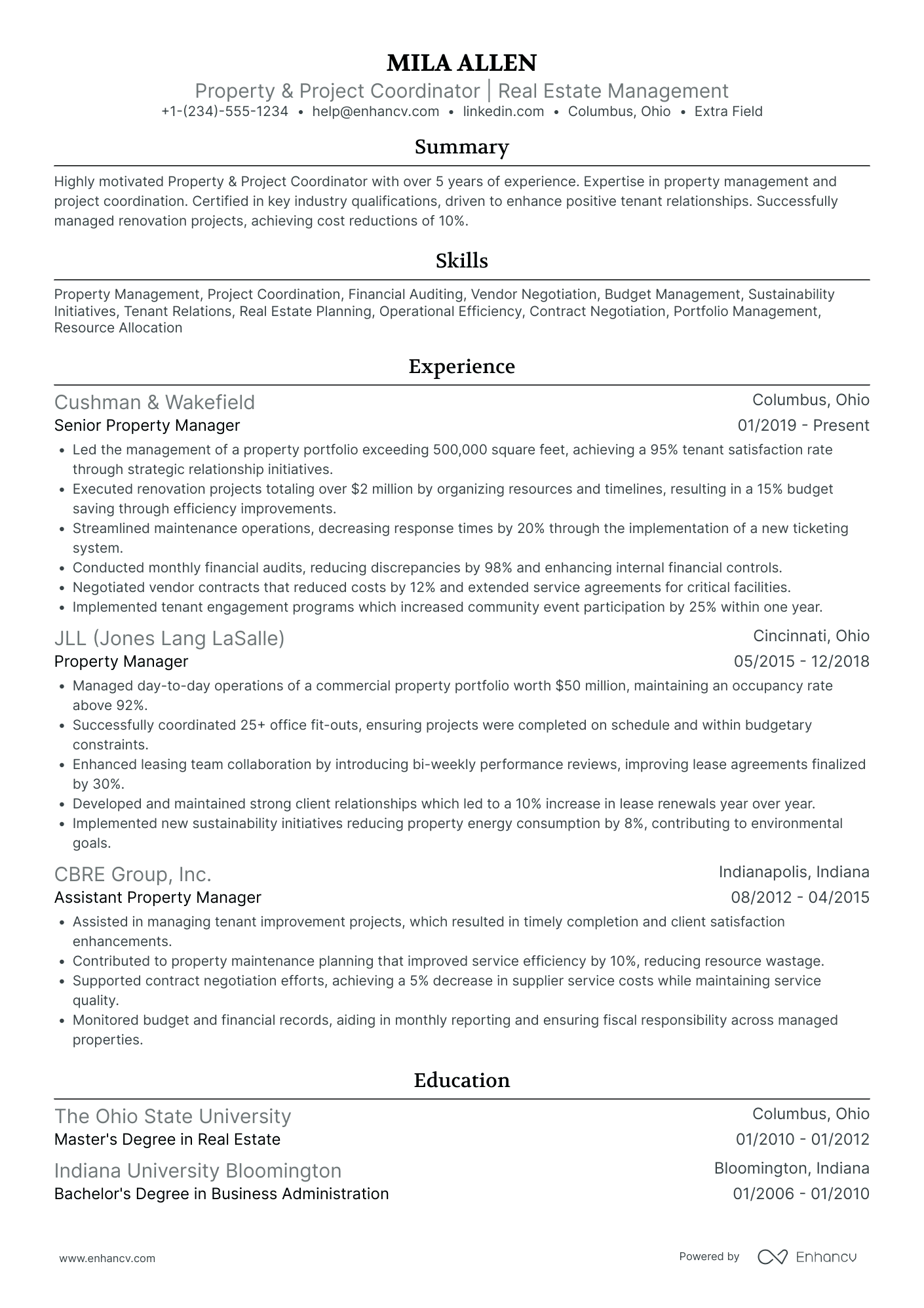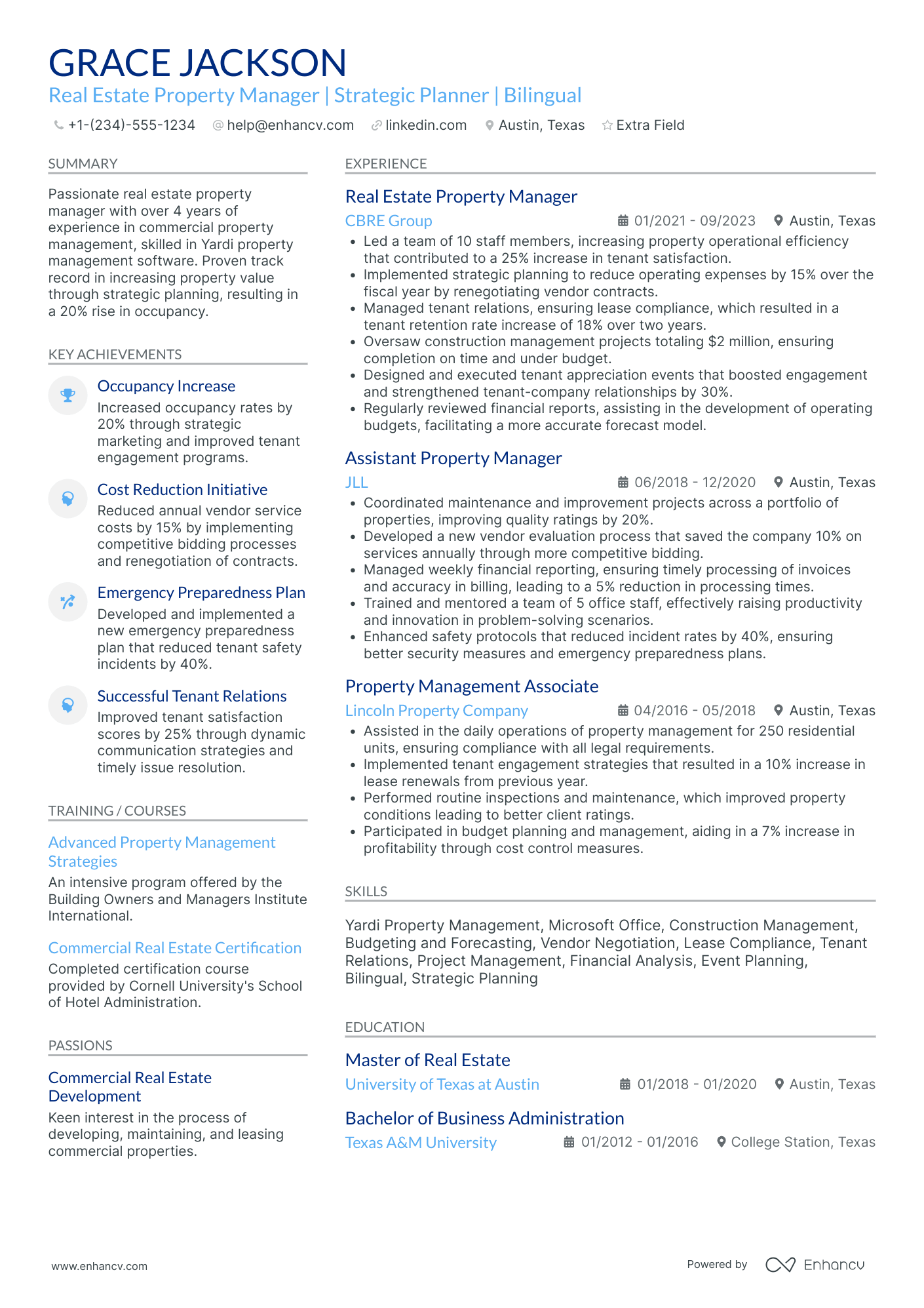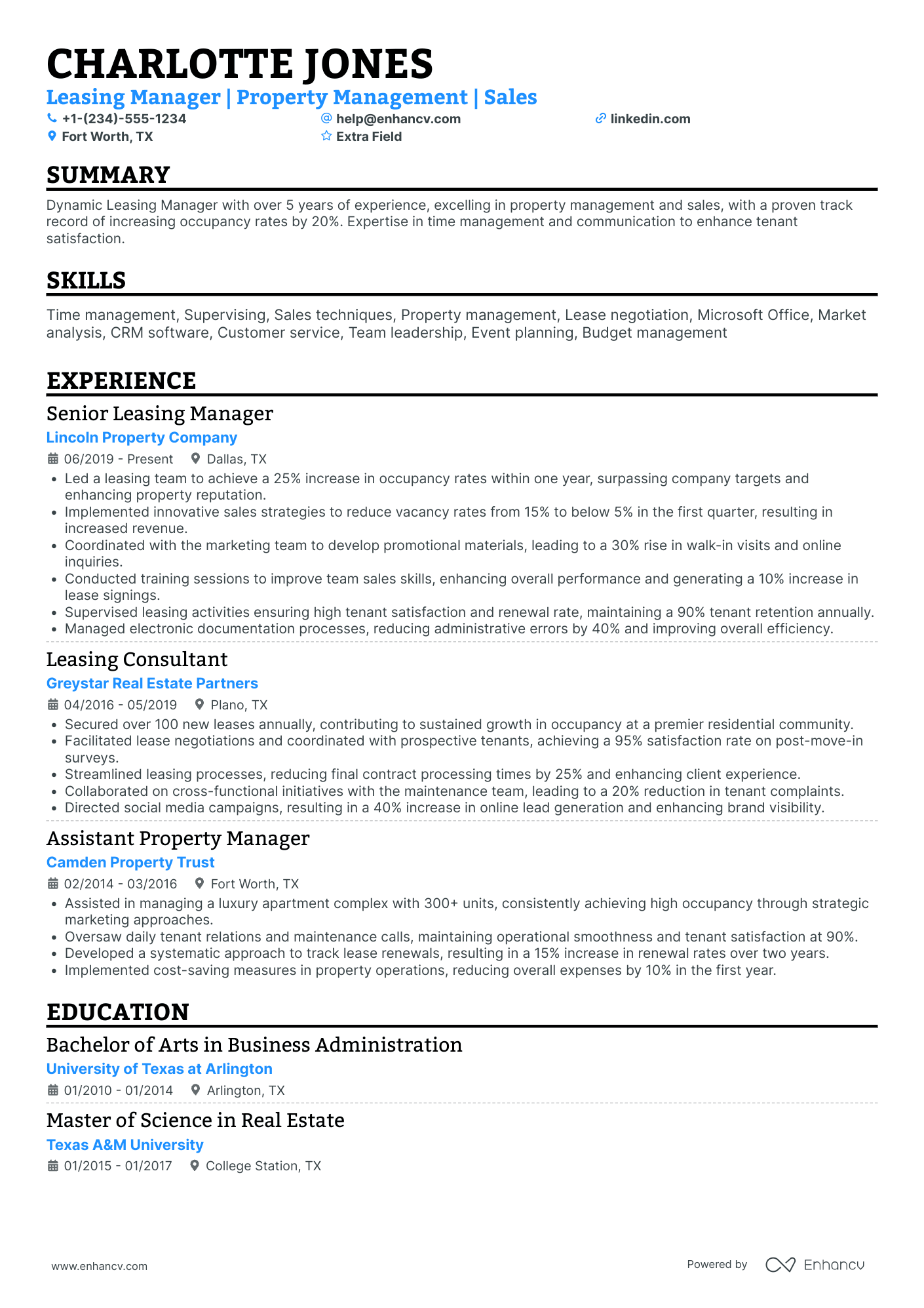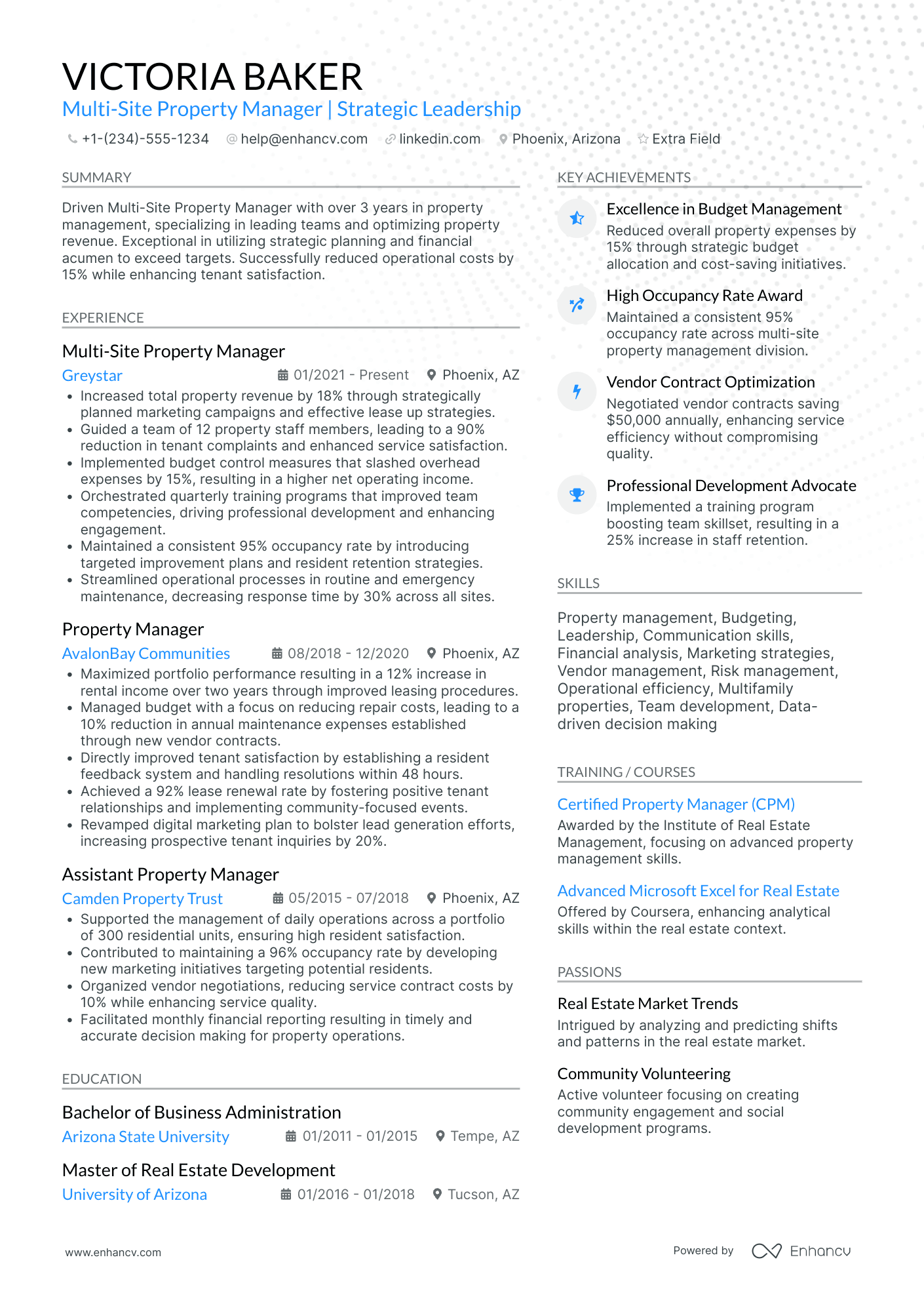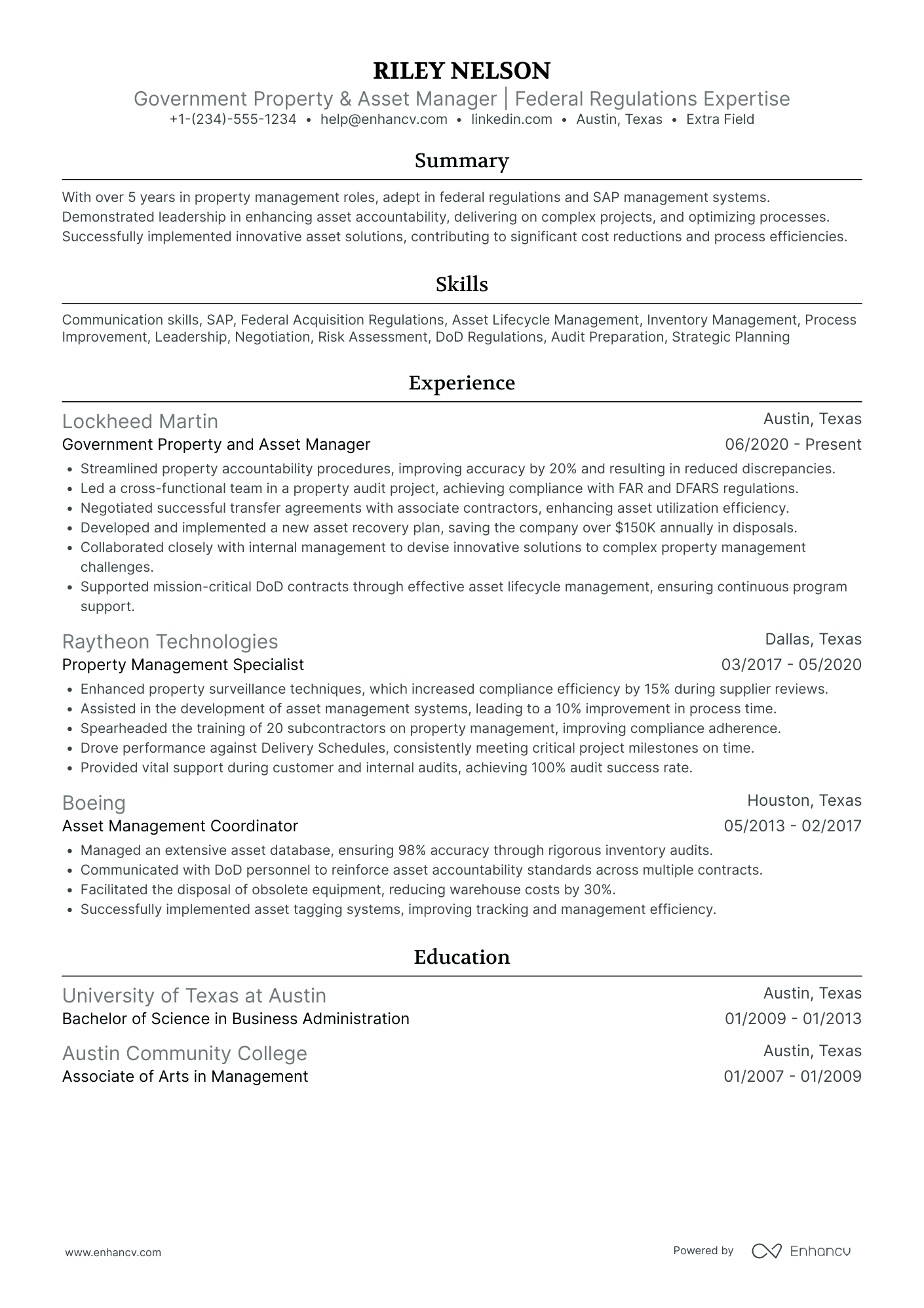In the world of property management, you'll find yourself following up on late rent and addressing urgent repairs while managing a diverse portfolio of 100 to 200 properties. It's definitely a demanding job, but also a rewarding one.
To stay on top of things, it's crucial to regularly visit your properties, whether you're working on-site or remotely, ensuring you're well-informed and abreast of the laws. Remember, in this industry, your primary clients are the property owners, not the tenants.
If you're looking for a job in this field, you’ll need a professional resume to help you make a strong first impression on recruiters.
What you’ll learn here:
- How do you choose a resume template that elevates your professional profile as a property manager?
- Which are the most important resume sections to include and how to write them?
- Which is the best way to highlight your property management experience?
- How can you detail your achievements in property management to reflect your impact on the industry?
- Which skills from the job description are essential to emphasize when crafting your property manager resume?
Here are a few housing-related resume guides that may be of interest to you:
- Assistant property manager Resume
- Facility Manager Resume
- Broker Resume
- Realtor Resume
- Real Estate Agent Resume
- Property manager Cover Letter
How to format a property manager resume
When selecting a resume format, consider how best to showcase your property management experience and skills.
The reverse-chronological resume format is often recommended because it allows potential employers to clearly see your career progression.
However, there are situations where alternative resume formats may be more suitable for property managers. A hybrid resume is ideal for those who have a diverse mix of relevant skills from different roles or who are making a significant career shift. This format effectively shows a broad skill set.
On the other hand, a functional resume is advisable for those with employment gaps. It emphasizes skills and experiences over a chronological work history, allowing you to highlight your competencies in a focused manner.
Here are some tailored resume tips and tricks:
- Don't use fancy fonts that ATS scanners can't read. Choose simple and professional fonts like Rubik, Montserrat, Lato, or Arial, and make sure the size is between 10 and 12 points.
- Maintain 1-inch margins around your resume. This conventional approach keeps it neat and visually appealing.
- Choose resume colors that are soothing to the eyes. Blue is a good choice because it works well in many professional settings.
- Keep your resume short and to the point, and try to fit everything on one page if possible.
- Include a header with your name and professional title, along with your contact information and LinkedIn profile link.
- Be sure to save your resume as a PDF to preserve its appearance on any device or platform.
Customize your resume for the market – a Canadian format, for example, might vary in structure.
In the United States, it's uncommon to include a photo on your resume. There's generally no need for it, and sometimes, not having a photo can even be advantageous for your application.
If your property management resume could use some fine-tuning, our intuitive AI resume checker is here to help. It scans your resume on 16 important points to make it eye-catching and more likely to get you interviews.
Is your resume good enough?
Drop your resume here or choose a file. PDF & DOCX only. Max 2MB file size.
Below are a few more sections that could benefit a property manager’s resume.
The top sections on a property manager resume:
- Contact information: This includes address, phone number, and email to provide transparent communication lines.
- Summary: A brief description of your experience, capabilities, and career goals related to property management is essential for introducing yourself to the hiring manager.
- Work experience: In this section, list all of your previous roles pertinent to property management, showing your ability and experience to handle the job posting.
- Relevant skills: Demonstrating your skills specific to property management, like tenant relations or property maintenance, will underscore your qualifications for the role.
Choosing how to organize the sections of your resume depends a lot on the property management position you're targeting. Take the time to look into the job description to identify relevant keywords to include in your resume. Here's what your resume needs to cover.
What recruiters want to see on your resume:
- Solid property management experience showing thorough job knowledge.
- Knowledge of property laws to ensure compliance and handle legal matters.
- Strong customer service skills due to regular tenant interactions.
- Good organizational and budgeting abilities to manage various responsibilities on a budget.
- Relevant certifications or degrees indicating ongoing professional development and expertise.
Now, we move into the section about your previous job experience. Employers review this part to see if your professional history aligns with what they need in a property management candidate.
How to write your property manager resume experience
Many job seekers find the work experience section of a property manager resume challenging, mainly because it plays a critical role in the recruiter's final decision.
Let’s dive into the nitty gritty of highlighting your property manager experience. First, we'll point out the don'ts in the following property manager resume example.
- •Responsible for screening and interviewing tenants.
- •Handled maintenance requests and resident issues.
- •Conducted regular site inspections and ensured timely maintenance repairs.
Here’s why this is a bad example?
- Lacks specific numbers to show the scale or impact of accomplishments.
- Doesn’t state how the actions improved the property or tenant satisfaction.
- Fails to show how the property manager's actions influenced property value.
- Uses passive phrases like "Responsible for" instead of active verbs like “Scheduled, Supervised, Coordinated”.
Keeping these improvements in mind, let's review the revised version.
- •Planned annual property operating budgets with monthly financial reporting to ensure a positive net operating income.
- •Maintained a 4.8 client satisfaction score while reducing tenant turnover through excellent client service and high-quality tenant screening
- •Supervised renovations and upgrades across multiple properties, increasing overall property value.
- •Saved $185K in construction management fees by negotiating better vendor contracts and developing an efficient inspection plan.
By organizing their experience section like this, the candidate gives potential employers a clear idea of their achievements.
This example is more effective for several reasons:
- It includes specific figures such as a 4.8 client satisfaction score and $185,000 saved, clearly quantifying the candidate's impact.
- The candidate demonstrates strategic thinking by planning budgets and negotiating contracts to improve financial outcomes.
- By mentioning supervised renovations and upgrades, the example highlights the applicant's role in enhancing property value.
- It covers a range of responsibilities from financial management to client service, showcasing a well-rounded skill set.
A strong experience section should be concise, ideally not exceeding five bullet points. Focus on showcasing your most relevant experiences. Additionally, it's advisable to avoid buzzwords as they typically don't add value to your application.
PRO TIP
Don’t lie on your resume because it’s the fastest way to sabotage yourself and get your application thrown in the trash. Lies are easy to detect during the interview and rarely do you any favor.
We recommend ensuring your resume is compatible with Applicant Tracking Systems (ATS) since employers use these systems to filter resumes by scanning for specific keywords and qualifications related to the job. Making your resume ATS-friendly can significantly improve your chances of landing the desired position.
How to quantify impact on your resume
Creating an experience section like the one mentioned above is quite straightforward. Simply incorporate any of the following tips to detail measurable achievements in your property manager’s resume.
- Detail the number of properties managed in previous roles to show the ability to handle multiple responsibilities simultaneously.
- Specify the percentage of rental occupancy rates you have maintained to demonstrate your efficiency in tenant retention and attraction.
- Indicate the amount you have reduced property maintenance costs to prove your financial management skills and cost-effectiveness.
- Quantify the number of lease agreements handled per year to display your proficiency in contract management.
- Mention the dollar value of the property portfolio you have managed to give an idea of your capability of dealing with large and potentially complex estates.
- Include the percent of satisfactory resolution of tenant complaints to reflect your problem-solving skills and tenant relationship management.
- Show the number of capital improvements initiated and completed to showcase your proactive approach to improving property value.
How do I write a property manager resume with no experience
Every state has different requirements for becoming a property manager, but most states require either a real estate license or a specific property management license. The National Property Management Association can provide details on the licensing requirements for property managers in your state.
While licensing may be required, many entry-level property managers work under a supervisor, and therefore not required.
Working with a temp agency is a good starting point in this field. Entry-level roles such as leasing agent, admin or tenant coordinator on the management side offer a practical way to get acquainted with property management. An internship in the field or a part-time job could also help you get your foot in the door. This experience can help you explore various aspects of the job and build your confidence in a professional setting.
If you have experience in maintenance, it's a real asset. It shows that you're capable of dealing with a variety of people and issues.
Here are a few more tips on how to craft a resume specifically for people without actual work experience in property management.
- Objective statement: Write a clear statement that shows your excitement for property management, describes your related experiences, and shares your career goals. Make sure it’s no longer than 3-4 sentences.
- Skills section: Emphasize key interpersonal skills such as customer service. Explain how your previous job experiences have prepared you for a role in property management.
- Experience Section: Underline any past work relevant to property management. Even if your previous jobs weren’t directly in this area, focus on tasks that involved dealing with tenants, handling lease agreements, or managing property maintenance.
- Education Section: Outline your educational history, especially any courses or certifications that are relevant to real estate, property management, or business studies. Including property management certifications will greatly strengthen your resume.
How to list your hard and soft skills on your resume
Make sure to showcase your skills across various parts of your resume, particularly in the experience and summary sections. However, it's also important to have a dedicated skills section to further emphasize your suitability for the job.
Organize your skills into two types: hard skills, which cover the technical details of the job, and soft skills, which enhance your interpersonal relations.
For hard skills, you might list expertise in property leasing, knowledge of real estate regulations, and familiarity with property management software.
Soft skills like communication, empathy, and customer service, are equally crucial. They showcase your ability to understand tenant needs, provide effective property solutions, and maintain strong relationships.
These are essential skills to include on a property manager's resume.
Best hard skills for your property manager resume
- Property management software
- Budget management
- Maintenance understanding
- Facilities management
- Legal compliance
- Financial reporting
- Property inspections
- Leasing contracts
- Real estate market knowledge
- Housing regulations
- Sustainability practices
- Rent collection
- Vendor coordination
- Microsoft Office
- Crisis management
Best soft skills for your property manager resume
- Integrity
- Communication skills
- Negotiation skills
- Problem-solving
- Customer service
- Persuasion
- Time management
- People skills
- Attention to detail
- Adaptability
- Organizational skills
- Decision making
- Empathy
- Diplomacy
- Multitasking
- Patience
How to list your education and certifications on your resume
The education section of your resume should detail your academic qualifications, including any degrees, certifications, or relevant coursework that supports your skills as a property manager.
In some states, property managers are required to pass a real estate licensing exam. This requirement stems from the fact that property managers often deal with tasks related to real estate law, including screening tenants and drafting leases. The specifics of real estate licensing vary from state to state.
Here’s a list of the laws and certifications necessary for property management by state. For accurate and updated details, it’s advisable to speak directly with a legal expert.
What to include in the education section of your property manager resume:
- Degree name: Specify the degree you have obtained.
- Institution name: Name the institution where you received your education.
- Graduation date: Indicate when you graduated or are expected to graduate.
- Field of study: Mention your field of study, especially if it's related to real estate or business management.
- Licensing: Include any relevant real estate licenses necessary for property management activities.
- Certifications: List any relevant property management certifications, such as Certified property manager (CPM) or Residential Management Professional (RMP).
- GPA: If your Great Point Average (GPA) is above 3.5 and you've graduated recently, consider including it.
PRO TIP
If you have both a major and a minor, always list your major first.
Here's how to format your education section correctly.
- •Completed required real estate courses and passed the state licensing exam
- •Specialization: People & Society
- •Relevant Coursework: Real Estate Fundamentals, Property Development, Real Estate Law, Urban Planning
- •Capstone Project: Led a team project analyzing the ROI of green building investments in urban developments
Including relevant certifications on your property management resume demonstrates your willingness to go beyond traditional education. This can boost your professional credibility and show potential employers that you’re committed to excellence in your field.
Let's see 5 certifications you can include in your portfolio.
Best certifications for your property manager resume
Once you've entered your work experience and educational qualifications in property management, take another look at the top of your resume. Craft a concise summary of your skills and key accomplishments in this space.
How to write your property manager resume summary or objective
Creating a captivating resume summary or objective for a property manager role involves concisely presenting your skills, experience, and the value you bring to the position. The choice between using a summary or an objective depends on your professional background and career goals. Here’s a guide on how to navigate these options.
Optimize your resume summary and objective for ATS
Drop your resume here or choose a file.
PDF & DOCX only. Max 2MB file size.
Resume Summary
A resume summary is ideal for property managers with significant experience. It should highlight your key achievements, essential skills, and how you can meet the needs of the property management company or agency.
We recommend following this formula:
PRO TIP
Resume Summary Formula:
[Adjective] [job title] with [number] years of experience in [industry], a proven ability to [relevant, measurable skills], and a strong background in [relevant context of your work experience] seeks a position as [the job title you’re applying for].
Resume objective
A resume objective is perfect for property managers who are new to the industry or just beginning their careers. It emphasizes your career goals and how you aim to contribute to and drive the success of the property management company or real estate agency.
Tips for crafting your summary or objective as a property manager:
- Keep it short: Keep it up to 3 sentences for a resume objective and up to 5 for a summary. Make sure the statement clearly shows your work history or goals.
- Personalize: Adjust your summary or objective specifically for the property management role you’re applying for and show how your past successes are a good match for the company's requirements.
- Show measurable successes: Illustrate your past achievements with specific metrics (e.g., "Managed 6 commercial buildings totaling 210,000 square feet, cutting costs by $185K through strategic negotiations and inspections").
- Emphasize key skills: Underline the skills that are critical for a property manager, such as managing tenant relationships, maintaining properties, and negotiating leases, aligning with the skills sought in the job description.
A well-crafted and personalized summary or objective can greatly improve your resume's impact.
Additional sections for a property manager resume
To enhance your property manager resume, consider adding a few extra sections. These can provide recruiters with a more comprehensive view of your capabilities:
- Volunteer work: If you have volunteer experience, especially in roles related to organization or customer service, include it. It demonstrates your commitment and ability to go beyond basic responsibilities.
- Achievements: Highlight significant accomplishments such as awards, positive tenant feedback, or successful project completions to show your dedication and effectiveness.
- Language skills: Mention if you’re multilingual. This is a valuable asset in managing properties with a diverse tenant base.
- Passions: Sharing your interests outside of work, whether it's gardening, sports, or arts, can illustrate that you’re a well-rounded individual.
Key takeaways
Before you assist clients with their property needs, let's recap the most important aspects of your property manager resume:
- Organize your resume with a captivating layout and format to keep recruiters engaged
- Create an appealing summary or an objective to introduce yourself and leave a memorable first impression
- Prioritize relevant achievements and career wins using measurable results that best highlight your worth
- Tailor your resume specifically for the property management role you’re applying for by aligning your skills and experiences with the job description.
- Highlight essential hard and soft skills, including lease management, tenant relations, communication, and negotiation.
- Feature a license or certificate to stick out to headhunters and help them hire you faster.
Property Manager resume examples
By Experience
By Role
